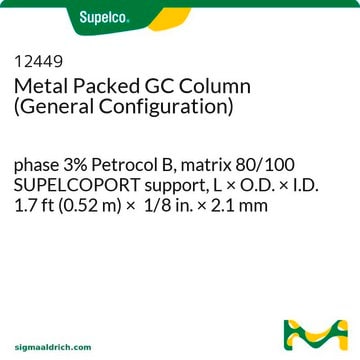If this product has an expiration or retest date, it will be shown on the Certificate of Analysis (COA, CofA). If there is no retest or expiration date listed on the product's COA, we do not have suitable stability data to determine a shelf life. For these products, the only date on the COA will be the release date; a retest, expiration, or use-by-date will not be displayed.
For all products, we recommend handling per defined conditions as printed in our product literature and website product descriptions. We recommend that products should be routinely inspected by customers to ensure they perform as expected.
For products without retest or expiration dates, our standard warranty of 1 year from the date of shipment is applicable.
For more information, please refer to the Product Dating Information document: https://www.sigmaaldrich.com/deepweb/assets/sigmaaldrich/marketing/global/documents/449/386/product-dating-information-mk.pdf
Wichtige Dokumente
214477
Silica gel Inorganic Sorbent
high-purity grade (Davisil Grade 923), 100-200 mesh
Größe auswählen
Größe auswählen
About This Item
Empfohlene Produkte
Produktbezeichnung
Kieselgel, high-purity grade (Davisil Grade 923), pore size 30 Å, 100-200 mesh
Qualität
high-purity grade (Davisil Grade 923)
Qualitätsniveau
Form
fine crystals
Hersteller/Markenname
Davisil®
Methode(n)
LPLC: suitable
Oberflächenbereich
430-530 m2/g
Matrix
Silica
Aktive Matrixgruppe
silica
Partikelgröße
100-200 mesh
75-150 μm
Porengröße
0.40 cm3/g pore volume
30 Å
bp
2230 °C
mp (Schmelzpunkt)
>1600 °C
Trenntechnik
hydrophilic interaction (HILIC)
SMILES String
O=[Si]=O
InChI
1S/O2Si/c1-3-2
InChIKey
VYPSYNLAJGMNEJ-UHFFFAOYSA-N
Suchen Sie nach ähnlichen Produkten? Aufrufen Leitfaden zum Produktvergleich
Verwandte Kategorien
Allgemeine Beschreibung
a: Aquagel – Poren sind mit Wasser gefüllt
b: Xerogel – durch Verdampfung wird die wässrige Phase in den Poren entfernt
c: Aerogel – Lösungsmittel wird durch superkritische Extraktion entfernt[1]
Anwendung
Fußnote
Gütegrad 923 entspricht den Spezifikationen für die Kohlenwasserstoffanalyse nach ASTM D1319.
Rechtliche Hinweise
Lagerklassenschlüssel
11 - Combustible Solids
WGK
nwg
Flammpunkt (°F)
Not applicable
Flammpunkt (°C)
Not applicable
Hier finden Sie alle aktuellen Versionen:
Besitzen Sie dieses Produkt bereits?
In der Dokumentenbibliothek finden Sie die Dokumentation zu den Produkten, die Sie kürzlich erworben haben.
Kunden haben sich ebenfalls angesehen
Verwandter Inhalt
Die Niederdruck-Flüssigkeitschromatographie (LPLC) ist eine chromatographische Technik, bei der die mobile Phase mit niedrigem Druck durch die Säule (stationäre Phase) gepumpt wird.
Low pressure liquid chromatography (LPLC) operates at low pressures, using a pump to drive the mobile phase onto the column.
-
How can I determine the shelf life / expiration / retest date of this product?
1 Antwort-
Hilfreich?
-
-
How is shipping temperature determined? And how is it related to the product storage temperature?
1 Antwort-
Products may be shipped at a different temperature than the recommended long-term storage temperature. If the product quality is sensitive to short-term exposure to conditions other than the recommended long-term storage, it will be shipped on wet or dry-ice. If the product quality is NOT affected by short-term exposure to conditions other than the recommended long-term storage, it will be shipped at ambient temperature. As shipping routes are configured for minimum transit times, shipping at ambient temperature helps control shipping costs for our customers. For more information, please refer to the Storage and Transport Conditions document: https://www.sigmaaldrich.com/deepweb/assets/sigmaaldrich/marketing/global/documents/316/622/storage-transport-conditions-mk.pdf
Hilfreich?
-
Aktive Filter
Unser Team von Wissenschaftlern verfügt über Erfahrung in allen Forschungsbereichen einschließlich Life Science, Materialwissenschaften, chemischer Synthese, Chromatographie, Analytik und vielen mehr..
Setzen Sie sich mit dem technischen Dienst in Verbindung.



